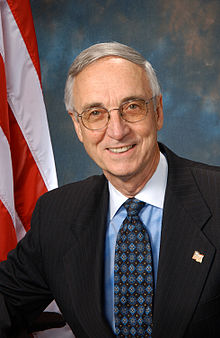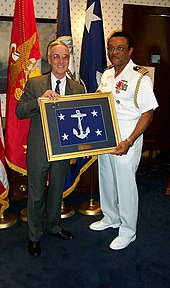
Donald Henry Rumsfeld was an American politician, government official and businessman who served as Secretary of Defense from 1975 to 1977 under president Gerald Ford, and again from 2001 to 2006 under President George W. Bush. He was both the youngest and the oldest secretary of defense. Additionally, Rumsfeld was a four-term U.S. Congressman from Illinois (1963–1969), director of the Office of Economic Opportunity (1969–1970), counselor to the president (1969–1973), the U.S. Representative to NATO (1973–1974), and the White House Chief of Staff (1974–1975). Between his terms as secretary of defense, he served as the CEO and chairman of several companies.
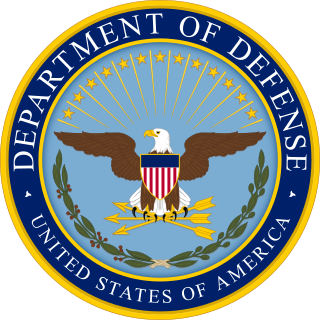
The United States secretary of defense (SecDef) is the head of the United States Department of Defense, the executive department of the U.S. Armed Forces, and is a high-ranking member of the federal cabinet. The secretary of defense's position of command and authority over the military is second only to that of the president of the United States, who is the commander-in-chief. This position corresponds to what is generally known as a defense minister in many other countries. The secretary of defense is appointed by the president with the advice and consent of the Senate, and is by custom a member of the Cabinet and by law a member of the National Security Council.

Paul Dundes Wolfowitz is an American political scientist and diplomat who served as the 10th President of the World Bank, U.S. Deputy Secretary of Defense, U.S. Ambassador to Indonesia, and dean of Paul H. Nitze School of Advanced International Studies (SAIS) at Johns Hopkins University. He is currently a visiting scholar at the American Enterprise Institute.

Douglas Jay Feith served as the under secretary of Defense for Policy for United States president George W. Bush, from July 2001 until August 2005. He is a senior fellow at the Hudson Institute, a conservative think tank.

The National Commission on Terrorist Attacks Upon the United States, commonly known as the 9/11 Commission, was set up on November 27, 2002, to investigate all aspects of the September 11 attacks, the deadliest terrorist attack in world history. It was created by Congressional legislation, which charged it with preparing "a full and complete account of the circumstances surrounding the September 11 attacks", including preparedness by the U.S. federal government for the attacks, the response following the attacks, and steps that can be taken to guard against a future terrorist attack.

Robert Michael Gates is an American intelligence analyst and university president who served as the 22nd United States secretary of defense from 2006 to 2011. He was appointed by President George W. Bush and was retained by President Barack Obama. Gates began his career serving as an officer in the United States Air Force but was quickly recruited by the Central Intelligence Agency (CIA). Gates served for twenty-six years in the CIA and at the National Security Council, and was director of central intelligence under President George H. W. Bush from 1991 to 1993. After leaving the CIA, Gates became president of Texas A&M University and was a member of several corporate boards. Gates served as a member of the Iraq Study Group, the bipartisan commission co-chaired by James A. Baker III and Lee H. Hamilton that studied the lessons of the Iraq War.

Stephen John Hadley is an American attorney and senior government official who served as the 20th United States National Security Advisor from 2005 to 2009. He served under President George W. Bush during the second term of his administration. Hadley was Deputy National Security Advisor during Bush's first term.

The Vulcans is a nickname used to refer to Republican presidential candidate George W. Bush's foreign policy advisory team assembled to brief him prior to the 2000 US presidential election.
The Office for the Administrative Review of the Detention of Enemy Combatants, established in 2004 by the Bush administration's Deputy Secretary of Defense Paul Wolfowitz, is a United States military body responsible for organising Combatant Status Review Tribunals (CSRT) for captives held in extrajudicial detention at the Guantanamo Bay detention camps in Cuba and annual Administrative Review Boards to review the threat level posed by deemed enemy combatants in order to make recommendations as to whether the U.S. needs to continue to hold them captive.
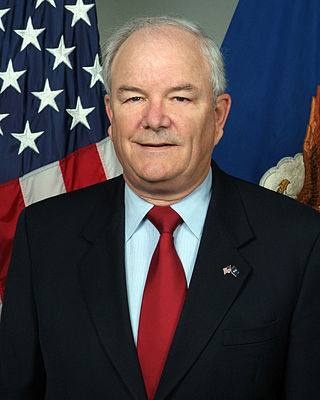
Michael Walter Wynne is an American politician and business executive and was the 21st United States Secretary of the Air Force. Secretary of Defense Robert Gates asked for and received his resignation on June 5, 2008, in the wake of the 2007 United States Air Force nuclear weapons incident and the mistaken shipment of Minuteman III parts to Taiwan in 2006, followed by an investigation by and a critical report from Admiral Kirkland H. Donald regarding the Minuteman incident.

William James "Jim" Haynes II is an American lawyer and was General Counsel of the Department of Defense during much of 43rd President George W. Bush's administration and his war on terror. Haynes resigned as general counsel effective March 2008.
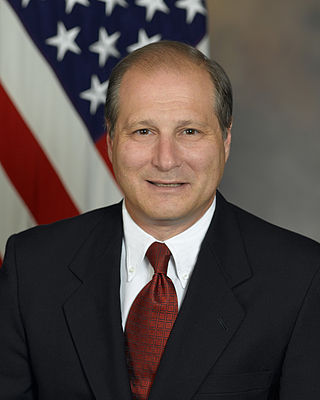
Eric Steven Edelman is an American diplomat who served as Under Secretary of Defense for Policy (2005–2009), U.S. Ambassador to Turkey (2003–2005), U.S. Ambassador to the Republic of Finland (1998–2001), and Principal Deputy Assistant to the Vice President for National Security Affairs (2001–2003). A career Foreign Service Officer, Edelman entered the Senior Foreign Service in 1992. He is a recipient of the Secretary of Defense's award for Distinguished Civilian Service (1993) and the State Department's Superior Honor Award.

Charles Douglas "Cully" Stimson is an American lawyer and government official. Stimson served as the Deputy Assistant Secretary of Defense for Detainee Affairs from 2005 until his resignation on February 2, 2007, following a controversy about his statements on legal representation for prisoners at Guantánamo Bay. Following his time in the George W. Bush administration, Stimson joined The Heritage Foundation, where he is currently a senior legal fellow and manager of the National Security Law Program. Earlier in his career, Stimson served as an Assistant United States Attorney for the District of Columbia and as Vice President for Private Equity Mergers & Acquisitions at Marsh & McLennan Companies.

Jeffrey D. "J.D." Gordon is an American communications and foreign policy adviser, who served as a Pentagon spokesman during the George W. Bush Administration and later a national security adviser to Donald Trump. Gordon is a retired United States Navy officer who was a senior adviser to numerous prominent Republican political figures. Gordon has also been a television commentator and columnist with various media outlets including One America News Network, Fox News, Sky News, The Daily Caller, USA Today, The Hill, The Washington Times and others. Gordon founded Protect America Today, a national security–themed Super PAC in February 2012.

Michael Bruce Donley is a United States government official who is the director of administration and management in the Office of the Secretary of Defense since May 2021, having served in the same position from 2005 to 2008. In the Bush and Obama administrations, Donley served as the 22nd secretary of the Air Force, amongst other positions. Donley has 30 years of experience in the national security community, including service on the staff of the United States Senate, White House and The Pentagon.

Robert Leon Wilkie Jr. is an American lawyer and government official who served as the United States Secretary of Veterans Affairs from 2018 to 2021, during the Trump administration. He was previously Under Secretary of Defense for Personnel and Readiness during the Trump administration, from November 2017 to July 2018. A Naval intelligence officer in the Reserve, he was Assistant Secretary of Defense for Legislative Affairs in the administration of President George W. Bush.
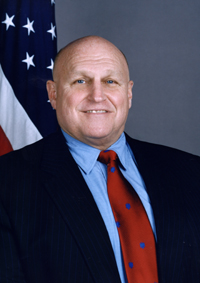
Richard Lee Armitage is an American former diplomat and government official. A graduate of the United States Naval Academy, Armitage served as a U.S. Navy officer in three combat tours of duty in the Vietnam War as a riverine warfare advisor. After leaving active duty, he served in a number of civil-service roles under Republican administrations. He worked as an aide to Senator Bob Dole before serving in various posts in the Defense Department and State Department.

James Daniel Howard was Special Assistant to President of the United States Ronald Reagan from July 1986 to February 1988, United States Assistant Secretary of Defense for Public Affairs from February 1988 to May 1989 and Under Secretary of the Navy from 1989 to 1993.

Duty: Memoirs of a Secretary at War is a nonfiction book written by Robert M. Gates, a former U.S. secretary of defense. It was published in January 2014 by Alfred A. Knopf. The book recounts Gates's service in the George W. Bush administration (2006–2009) and the Obama administration (2009–2011), including his experiences managing the Afghan and Iraq wars.

Patrick “Pat” Michael Shanahan is an American businessman. the president and chief executive officer of Spirit AeroSystems. He is a former United States federal government official who served as the acting United States Secretary of Defense in 2019. President Donald Trump appointed Shanahan to the role after the resignation of Jim Mattis. Prior to that, Shanahan served as Deputy Secretary of Defense from 2017 to 2019. Before his government service, he previously spent 30 years at Boeing in a variety of roles.
